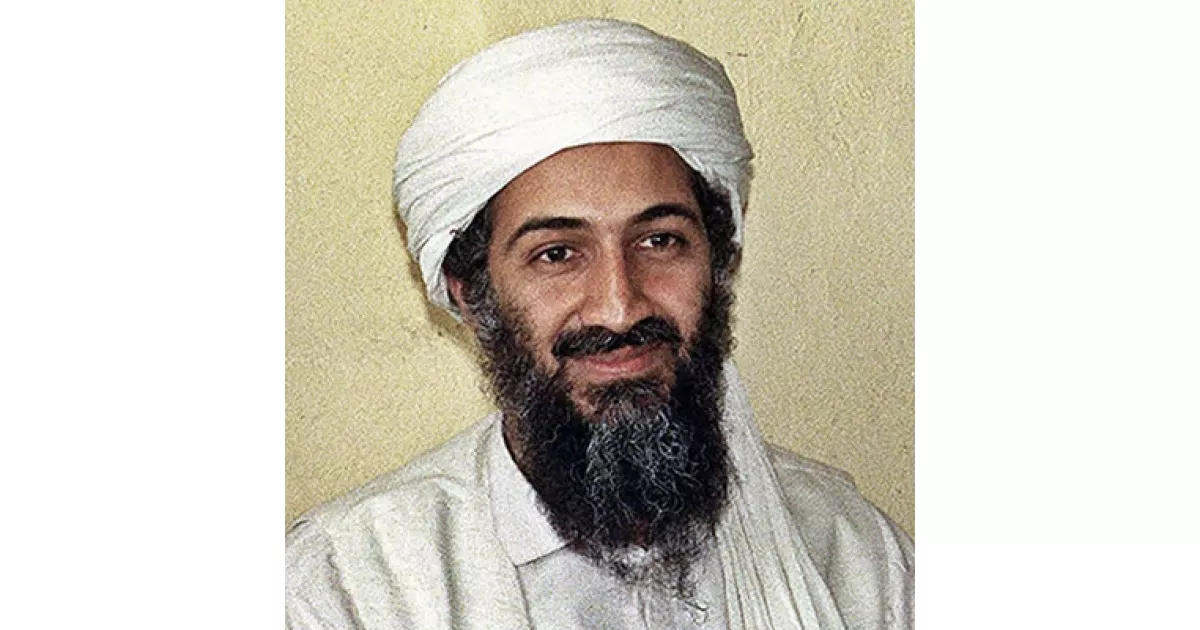Osama bin Laden was the founder and leader of al-Qaeda, a militant organization. He fought against the Soviet Union in Afghanistan and supported Bosnian mujahideen. Bin Laden opposed U.S. foreign policy in the Middle East, declaring war on the United States in 1996. He orchestrated and supervised the September 11 attacks in 2001, which targeted U.S. assets and resulted in significant casualties, solidifying his role as a key figure in global terrorism.
March 1957: Osama bin Laden Born in Riyadh
On 10 March 1957, Osama bin Laden was born in Riyadh, Saudi Arabia, to Muhammad bin Ladin, a billionaire construction magnate, and Hamida al-Attas.
1967: Death of Mohammed bin Ladin
In 1967, Mohammed bin Ladin, Osama bin Laden's father, died in an airplane crash in Saudi Arabia.
1968: Attended Al-Thager Model School
From 1968, Osama bin Laden attended the elite Al-Thager Model School.
1974: Married Najwa Ghanem
In 1974, at age 17, Osama bin Laden married Najwa Ghanem in Latakia, Syria.
1976: Finished Attending Al-Thager Model School
Until 1976, Osama bin Laden attended the elite Al-Thager Model School.
1979: Joined the Mujahideen in Afghanistan
In 1979, Osama bin Laden joined the mujahideen fighting against the Soviet invasion of Afghanistan, marking his entry into militant activities.
1979: Potentially earned a degree in civil engineering
In 1979, Osama bin Laden may have earned a degree in civil engineering at King Abdulaziz University.
1980: Bin Laden Acted as a Liaison
Beginning in early 1980, Bin Laden acted as a liaison between the Saudi General Intelligence Presidency (GIP) and Afghan warlords.
1981: Potentially earned a degree in public administration
In 1981, Osama bin Laden may have earned a degree in public administration at King Abdulaziz University.
1982: Bin Laden on America allowing Israelis to invade Lebanon
In 1982, America allowed the Israelis to invade Lebanon, helped by the US Sixth Fleet.
1983: Married Khadijah Sharif
In 1983, Osama bin Laden married Khadijah Sharif, who he later divorced in the 1990s.
1984: Established Maktab al-Khidamat
In 1984, Osama bin Laden and Azzam established Maktab al-Khidamat. The organization funneled money, arms, and fighters from around the Arab world into Afghanistan.
1985: Married Khairiah Sabar
In 1985, Osama bin Laden married Khairiah Sabar.
1986: Set up a Base in Eastern Afghanistan
From 1986, Osama bin Laden set up a base in eastern Afghanistan for his own Arab soldiers.
1987: Married Siham Sabar
In 1987, Osama bin Laden married Siham Sabar.
1987: Participated in the Battle of Jaji
In 1987, Osama bin Laden participated in some combat activity against the Soviets, such as the Battle of Jaji in eastern Afghanistan.
May 1988: Massacre of Shias in Gilgit
In May 1988, large numbers of Shias from in and around Gilgit, Pakistan were killed in a massacre that is alleged to have involved Osama bin Laden leading an armed group of Sunni tribals to suppress a revolt.
August 1988: Formalization of al-Qaeda
In August 1988, notes from a meeting indicate that al-Qaeda had become a formal group with the goal to promote Islamic beliefs. Requirements for membership included obedience, good manners, and pledging allegiance to superiors.
1988: Death of Salem bin Laden
In 1988, Salem bin Laden, Osama bin Laden's eldest half-brother, died in a plane crash in the U.S.
1988: Founded al-Qaeda
In 1988, as the Soviet war in Afghanistan was ending, Osama bin Laden founded al-Qaeda. He aimed to carry out worldwide jihad.
February 1989: Bin Laden's Return to Saudi Arabia
In February 1989, following the Soviet Union's withdrawal from Afghanistan, Bin Laden returned to Saudi Arabia and was regarded as a hero of jihad. He then engaged in opposition movements against the Saudi monarchy.
March 1989: Battle of Jalalabad
In March 1989, Bin Laden led 800 Arab foreign fighters during the unsuccessful Battle of Jalalabad, where he personally led his men to immobilize the 7th Sarandoy Regiment, resulting in massive casualties.
August 1990: Iraqi Invasion of Kuwait and Bin Laden's Offer to Defend Saudi Arabia
In August 1990, following Iraq's invasion of Kuwait, Bin Laden met with King Fahd and Defense Minister Sultan, offering his Arab legion to defend Saudi Arabia instead of relying on non-Muslim assistance from the U.S. His offer was declined.
November 1990: FBI Raid on El Sayyid Nosair's Home
On November 8, 1990, the FBI raided the New Jersey home of El Sayyid Nosair, an associate of al-Qaeda operative Ali Mohamed, and discovered evidence of terrorist plots, including plans to blow up New York City skyscrapers.
1990: Bin Laden Funds Afghan Coup Attempt
In 1990, Bin Laden funded the Afghan coup d'état attempt led by General Shahnawaz Tanai, a hardcore communist. He also lobbied the Parliament of Pakistan to carry out an unsuccessful motion of no confidence against Prime Minister Benazir Bhutto.
1990: President Bush's Assurance to King Fahd
In 1990, President George H. W. Bush assured King Fahd that U.S. forces would withdraw from Saudi Arabia once the Iraqi threat was dealt with. However, by 1996, the Americans were still there.
1991: Bin Laden's Criticism and House Arrest
In 1991, Bin Laden publicly criticized Saudi dependence on U.S. forces, leading to his house arrest and eventual forced departure from the country. The U.S. 82nd Airborne Division was deployed in Dhahran.
1991: Expulsion from Saudi Arabia
In 1991, Bin Laden was expelled from Saudi Arabia after repeatedly criticizing the alliance with the United States. He and his followers moved to Afghanistan.
April 1992: Pacifying Role in Afghanistan Civil War
In March–April 1992, Bin Laden tried to play a pacifying role in the escalating civil war in Afghanistan, by urging warlord Gulbuddin Hekmatyar to join the mujahideen leaders negotiating a coalition government instead of trying to conquer Kabul.
December 1992: Bombing of the Gold Mohur Hotel in Aden
On December 29, 1992, the Gold Mohur Hotel in Aden was bombed, resulting in two deaths. This is believed to be the first bombing attack involving Bin Laden.
1992: U.S. Aid to Mujahideen Ends
From 1979 to 1992, the U.S., Saudi Arabia, and China provided financial aid and weapons to the mujahideen through Pakistan's Inter-Services Intelligence (ISI).
1992: Al-Qaeda's Assistance to Jihadis
In 1992, Bin Laden's al-Qaeda assisted jihadis financially and militarily in Algeria, Egypt, and Afghanistan.
1993: Bin Laden Sent Aid to Algerian Islamists
In 1992 or 1993, Bin Laden sent an emissary, Qari el-Said, with $40,000 to Algeria to aid the Islamists. Their advice was heeded, resulting in a war that caused the deaths of 150,000 to 200,000 Algerians.
1993: Bin Laden allegedly granted Bosnian citizenship
In 1993, Bin Laden and his assistant Mehrez Aodouni were allegedly granted citizenship and Bosnian passports by the government in Sarajevo. The Bosnian government later denied this information.
1993: Nosair Connected to World Trade Center Bombing
In 1993, El Sayyid Nosair was convicted in connection with the 1993 World Trade Center bombing and later admitted guilt for the murder of Rabbi Meir Kahane in New York City on November 5, 1990.
March 1994: Killing of German intelligence agent and wife in Libya
On March 10, 1994, Silvan Becker, a German intelligence agent, and his wife Vera were killed in Libya.
1994: Loss of Saudi Citizenship and Stipend
In 1994, King Fahd of Saudi Arabia stripped Bin Laden of his Saudi citizenship and persuaded his family to cut off his $7 million a year stipend due to Bin Laden's continued criticism of the Saudi monarchy.
1995: EIJ Attempt to Assassinate Hosni Mubarak and Al-Qaeda's Justification for Killing Innocents
In 1995, the EIJ attempted to assassinate Egyptian President Hosni Mubarak, which failed, leading al-Qaeda to develop its justification for the killing of innocent people via a fatwa issued by Mamdouh Mahmud Salim.
1995: Sudan's Offer to Expel Bin Laden
In late 1995, the State Department and the CIA learned that Sudanese officials were discussing with the Saudi government the possibility of expelling Bin Laden. US Ambassador Timothy Carney encouraged the Sudanese to pursue this course, but Saudis did not want Bin Laden because they had already revoked his citizenship.
January 1996: CIA Launches Bin Laden Issue Station
In January 1996, the CIA launched the Bin Laden Issue Station, code-named "Alec Station", a new unit of its Counterterrorism Center (CTC) headed by Michael Scheuer, to track and conduct operations against Bin Laden's activities.
February 1996: Sudan's Secret Discussions to Expel Bin Laden
In February 1996, Sudanese officials began secret meetings with Saudi officials, offering to expel Bin Laden to Saudi Arabia if they would pardon him. The US became aware of these discussions, but Saudi officials did not want Bin Laden in their country.
May 1996: Bin Laden's Expulsion to Afghanistan
On May 18, 1996, due to increasing pressure on Sudan, Bin Laden was permitted to leave for Jalalabad, Afghanistan, where he developed a close relationship with Mullah Omar. The expulsion significantly weakened Bin Laden and his organization.
August 1996: Bin Laden's Declaration of War
In August 1996, Bin Laden issued a fatawā titled "Declaration of War against the Americans Occupying the Land of the Two Holy Places", published by Al-Quds Al-Arabi, criticizing U.S. forces in Saudi Arabia.
August 1996: Declared Holy War Against the U.S.
In August 1996, Osama bin Laden declared a fatwā. He declared holy war against the U.S.
1996: Bin Laden Declares War on the United States
In 1996, Osama bin Laden declared war on the United States. He advocated for attacks targeting U.S. assets in various countries due to his opposition to American foreign policy in the Middle East.
June 1997: Confessions of ties with Bosnian Muslim forces and Bin Laden
In The New York Times' June 26, 1997 report on the bombing of the Al Khobar building in Riyadh, Saudi Arabia, it was noted that those arrested confessed to serving with Bosnian Muslim forces and admitted to ties with Bin Laden.
November 1997: Bin Laden Funder of Luxor Massacre
In November 1997, Osama Bin Laden was claimed to have funded the Luxor massacre which killed 62 civilians. Also in mid 1997, the Northern Alliance threatened to overrun Jalalabad, causing him to abandon his Najim Jihad compound and move his operations to Tarnak Farms in the south.
1997: Nasser al-Bahri Becomes Bin Laden's Bodyguard
From 1997, Nasser al-Bahri was Bin Laden's personal bodyguard.
February 1998: Declared Holy War Against the U.S.
In February 1998, Osama bin Laden declared a fatwā. He declared holy war against the U.S.
February 1998: Bin Laden issues fatwa against U.S.
In February 1998, Osama bin Laden, along with Ayman al-Zawahiri and others, issued a fatwa entitled "Declaration of the World Islamic Front for Jihad against the Jews and the Crusaders". This called upon Muslims to attack the U.S. and its allies, citing grievances such as the presence of American forces in the Arabian Peninsula, sanctions against Iraq, and Israeli repression of Palestinians.
May 1998: Bin Laden Claims Israeli State Seeks to Annex Arabian Peninsula
In May 1998, Osama bin Laden claimed in an interview with ABC News that the Israeli state's ultimate goal was to annex the Arabian Peninsula and the Middle East, accusing the U.S. of stirring up anti-Islamic sentiment.
June 1998: Bin Laden and al-Zawahiri organize al-Qaeda congress
On June 24, 1998, Osama bin Laden and al-Zawahiri organized an al-Qaeda congress.
June 1998: Bin Laden indicted by U.S. grand jury
On June 8, 1998, Osama bin Laden was first indicted by a grand jury of the U.S. on charges of conspiracy to attack defense utilities of the U.S. and for being the head of al-Qaeda.
August 1998: U.S. missile strikes on Bin Laden's training camps
On August 20, 1998, 66 cruise missiles launched by U.S. Navy ships struck Bin Laden's training camps near Khost in Afghanistan, missing him by a few hours. The Clinton administration had authorized the CIA to apprehend Bin Laden, dead or alive, following the 1998 embassy attacks.
August 1998: U.S. retaliates for embassy bombings with missile strikes
On August 20, 1998, in retaliation for the embassy bombings, U.S. President Bill Clinton ordered cruise missile strikes on Bin Laden-related targets in Sudan and Afghanistan.
August 1998: U.S. embassy bombings in East Africa
On August 7, 1998, simultaneous truck bomb explosions occurred at the U.S. embassies in Dar es Salaam, Tanzania, and Nairobi, Kenya, killing hundreds. These 1998 U.S. embassy bombings brought Osama bin Laden and Ayman al-Zawahiri to the attention of the U.S. public. Al-Qaeda later claimed responsibility.
November 1998: Bin Laden indicted for 1998 embassy attacks
On November 4, 1998, Osama bin Laden was indicted by a Federal Grand Jury in the United States District Court for the Southern District of New York, on charges related to the 1998 embassy attacks. Evidence included testimony by former al-Qaeda members and satellite phone records.
December 1998: Bin Laden Claims Jews Control U.S. and UK Governments
In December 1998, Osama bin Laden claimed in an interview with Pakistani journalist Rahimullah Yusufzai that Operation Desert Fox proved that Israeli Jews controlled the governments of the U.S. and the United Kingdom.
December 1998: CIA reports al-Qaeda preparing for attacks in the U.S.
In December 1998, the CIA reported to Clinton that al-Qaeda was preparing for attacks in the U.S., including training personnel to hijack aircraft.
1998: Indictment of Bin Laden for capital crimes in the 1998 embassy attacks
In 1998, Osama bin Laden was indicted along with others for capital crimes in the 1998 embassy attacks.
1998: Arrest of EIJ members in Albania
In 1998, four members of EIJ were arrested in Albania and extradited to Egypt, related to Bin Laden's network.
1998: Indictment for 1998 embassy attack
In October 2001, Osama bin Laden appeared on the initial list of the top 22 FBI Most Wanted Terrorists, which was based on the indictment for the 1998 embassy attack.
June 1999: Bin Laden added to FBI Ten Most Wanted Fugitives list
On June 7, 1999, Osama bin Laden became the 456th person listed on the FBI Ten Most Wanted Fugitives list, following his indictment for capital crimes in the 1998 embassy attacks.
June 1999: FBI places Bin Laden on Ten Most Wanted list
On June 7, 1999, the FBI placed Osama bin Laden on its Ten Most Wanted list.
October 15, 1999: UN designates al-Qaeda as a terrorist organization
On October 15, 1999, the United Nations designated al-Qaeda as a terrorist organization through UN Security Council Resolution 1267, which aimed to impose sanctions on individuals and entities associated with al-Qaeda.
October 1999: Al-Qaeda Designated as a Terrorist Organization
In October 1999, the United Nations designated al-Qaeda as a terrorist organization.
December 1999: Bin Laden financed convoys of recruits through businesses in Sudan
According to Middle East intelligence reports, in December 1999 Bin Laden financed small convoys of recruits from the Arab world through his businesses in Sudan. Among them was Karim Said Atmani, identified as the document forger for a group accused of plotting bombings in the United States.
December 1999: Arrests of individuals linked to terrorism plots
In late December 1999, Khalil al-Deek was arrested in Jordan on suspicion of involvement in a plot to blow up tourist sites. Also, a search revealed former mujahideen linked to suspected terrorist groups had lived near Sarajevo.
1999: Milošević claims al-Qaeda presence in the Balkans
In 1999, during his trial at the International Criminal Tribunal, Slobodan Milošević quoted a purported FBI report stating that al-Qaeda had a presence in the Balkans and aided the Kosovo Liberation Army. He also claimed that Bin Laden used Albania as a launchpad for violence.
1999: Aborted plan to capture or kill Bin Laden
In 1999, the CIA and Pakistani military intelligence prepared a team to capture or kill Bin Laden in Afghanistan, but the plan was aborted due to the 1999 Pakistani coup d'état.
1999: Press reports on Bin Laden's Bosnian citizenship
In 1999, the press reported that Bin Laden and his Tunisian assistant Mehrez Aodouni were granted citizenship and Bosnian passports in 1993 by the government in Sarajevo. The Bosnian government denied this information following the September 11 attacks.
January 2000: Islamic militants plan triple attack
In late 2000, it was revealed that Islamic militants led by Bin Laden had planned a triple attack for January 3, 2000, including bombings in Jordan and an attack on a target within the United States. The plan was foiled by arrests and the sinking of an explosive-filled skiff.
2000: Married Amal al-Sadah
In 2000, Osama bin Laden married Amal al-Sadah.
2000: Differing views on Clinton administration's focus on Bin Laden
In 2000, before the September 11 attacks, Paul Bremer characterized the Clinton administration as correctly focused on Bin Laden, while Robert Oakley criticized their obsession with Osama.
2000: Failed assassination attempt on Bin Laden
In 2000, foreign operatives working for the CIA fired a rocket-propelled grenade at a convoy of vehicles in which Bin Laden was traveling in Afghanistan, hitting one vehicle but not the one Bin Laden was in.
2000: State Department Authorizes U.S. Intelligence Officials to Visit Sudan
In 2000, the U.S. State Department authorized U.S. intelligence officials to visit Sudan, after initially refusing to meet with them even after Sudan had expelled Bin Laden.
August 2001: Intelligence report on Bin Laden's plans to strike in U.S.
On August 6, 2001, U.S. president George W. Bush received an intelligence report titled "Bin Laden Determined to Strike in U.S."
September 11, 2001: Bin Laden interview with Hamid Mir
Two months after the September 11, 2001 attacks, Bin Laden stated during an interview with Pakistani journalist Hamid Mir.
September 2001: Denial of Involvement in 9/11 Attacks
In September 2001, Osama bin Laden initially denied involvement in the 9/11 attacks, releasing a statement broadcast by Al Jazeera on September 16, 2001, denying responsibility for the attacks.
September 2001: Najwa Ghanem Leaves Afghanistan
On 9 September 2001, Najwa Ghanem, Osama bin Laden's wife, left Afghanistan two days before the 9/11 attacks.
September 2001: September 11 attacks
On September 11, 2001, al-Qaeda launched the September 11 attacks, using commercial airplanes as missiles against targets in the U.S., including the World Trade Center and the Pentagon, resulting in the deaths of at least 2,750 people. Communications intercepted on the day of the attacks pointed to Bin Laden's responsibility.
September 2001: George W. Bush's 'Wanted: Dead or Alive' Statement
On September 17, 2001, President George W. Bush referenced a 'Wanted: Dead or Alive' poster in relation to Osama bin Laden, indicating the U.S. government's stance on his capture.
October 2001: Bosnia and Herzegovina as a safe haven for terrorists
In October 2001, a former U.S. State Department official described Bosnia and Herzegovina as a safe haven for terrorists, asserting that militant elements of the former Sarajevo government were protecting extremists, some with ties to Bin Laden.
October 2001: Bombing of Afghanistan
In October 2001, attempts at assassination and requests for the extradition of Bin Laden from the Taliban of Afghanistan were met with failure before the bombing of Afghanistan.
October 2001: Bin Laden on FBI Most Wanted List
On October 10, 2001, Osama bin Laden was added to the FBI's list of Top 22 Most Wanted Terrorists, based on the indictment for the 1998 embassy attacks.
November 2001: Videotape discussing 9/11 attack recovered
In November 2001, U.S. forces recovered a videotape in Jalalabad showing Osama bin Laden discussing the 9/11 attacks with Khaled al-Harbi, suggesting prior knowledge of the event.
December 2001: Broadcast of Videotape
On December 13, 2001, a videotape recovered in November showed Bin Laden discussing the attacks, it was broadcast on various news networks, though the translation's accuracy was later disputed.
2001: Construction of Abbottabad Compound Begins
Imagery indicates that the compound where Bin Laden was found in Abbottabad was built between 2001 and 2005.
2001: Supervised the Execution of the September 11 Attacks
In 2001, Osama bin Laden supervised the execution of the September 11 attacks inside the U.S..
2001: Believed hiding in White Mountains during Battle of Tora Bora
In late 2001, Osama bin Laden was believed to be hiding in the White Mountains (Spin Ghar) in Afghanistan's east, near the Pakistani border, during the Battle of Tora Bora. A failure by the U.S. to commit enough U.S. ground troops to hunt him led to his escape.
2001: Nasser al-Bahri was Bin Laden's Bodyguard
Until 2001, Nasser al-Bahri was Bin Laden's personal bodyguard.
2002: Bin Laden Claims Jews Control Media and Politics
In 2002, Osama bin Laden claimed that Jews controlled civilian media outlets, politics, and economic institutions of the United States in a released letter.
2002: Letter to the American People Published
In 2002, Osama bin Laden's Letter to the American People was published, describing the formation of the Israeli state as a crime and demanding the U.S. withdraw personnel from Muslim lands.
2002: Bin Laden's Criticism of U.S. Governance
In late 2002, Bin Laden criticized the U.S. for its secular form of governance. He called upon Americans to convert to Islam and reject immoral acts.
2004: Bin Laden claims responsibility for 9/11
In 2004, Osama bin Laden abandoned his denials regarding the 9/11 attacks and claimed personal direction of the nineteen hijackers in a video played on Al-Jazeera.
2004: Bin Laden Speaks of Bleeding America
In 2004, Osama bin Laden spoke of "bleeding America to the point of bankruptcy" in a tape broadcast by Al Jazeera, outlining his strategy of luring enemies into long wars of attrition.
December 2005: Bin Laden Based in Waziristan
In December 2005, a letter indicated that Osama bin Laden and the al-Qaeda leadership were based in the Waziristan region of Pakistan at the time.
2005: Construction of Abbottabad Compound Ends
Imagery indicates that the compound where Bin Laden was found in Abbottabad was built between 2001 and 2005.
2005: CIA Unit Shut Down
In late 2005, the CIA unit dedicated to capturing Osama bin Laden was shut down.
May 2006: Al-Jazeera Airs Tape of Bin Laden Claiming Responsibility
On May 23, 2006, Al-Jazeera aired a tape in which Osama bin Laden announced, "I am the one in charge of the nineteen brothers. ... I was responsible for entrusting the nineteen brothers ... with the raids."
September 2006: Al-Jazeera Broadcasts Videotape of 9/11 Preparations
On September 7, 2006, a videotape broadcast by Al-Jazeera showed Osama bin Laden with Ramzi bin al-Shibh and two of the 9/11 hijackers, Hamza al-Ghamdi and Wail al-Shehri, making preparations for the attacks.
2006: Alleged Imprisonment by ISI
According to Seymour M. Hersh, in 2006, Bin Laden had been a prisoner of the ISI at the Abbottabad compound.
July 2007: Senate Votes to Double Reward for Bin Laden
On July 13, 2007, the Senate voted to double the reward for information leading to the capture or death of Osama bin Laden to $50 million, although the amount was never officially changed.
August 2007: US and Afghanistan forces raid mountain caves in Tora Bora
Between August 14 and 16, 2007, U.S. and Afghanistan forces raided the mountain caves in Tora Bora after receiving intelligence of a pre-Ramadan meeting held by al-Qaeda members. They did not find either Bin Laden or al-Zawahiri.
August 2007: Al-Qaeda Releases Video Demonstrating Bin Laden's Survival
In August 2007, al-Qaeda released a video demonstrating Osama bin Laden's continued survival, where he claimed sole responsibility for the September 11 attacks and denied any prior knowledge of them by the Taliban or the Afghan people.
October 2008: Obama Pledges to Kill Bin Laden
On October 7, 2008, during a presidential debate, then-candidate Barack Obama pledged to kill Osama bin Laden and crush al-Qaeda as a top national security priority.
February 2009: Taliban Detainee Claims Bin Laden Sighting in Afghanistan
Early in December 2009, a Taliban detainee in Pakistan said he had information that Bin Laden was in Afghanistan that year; he said that in January or February 2009, he met a trusted contact who had seen Bin Laden in Afghanistan about 15 to 20 days earlier.
March 2009: Hunt for Bin Laden Centered in Chitral District
In March 2009, it was reported that the hunt for Osama bin Laden had centered in the Chitral District of Pakistan, including the Kalam Valley. Pakistan's Prime Minister Gillani rejected claims that Osama bin Laden was hiding in Pakistan.
December 2009: US Officials Comment on Bin Laden's Whereabouts
In December 2009, U.S. Secretary of Defense Robert Gates stated the United States had no reliable information on Osama bin Laden's whereabouts in years. General Stanley McChrystal indicated that al-Qaeda could not be defeated unless Bin Laden was captured or killed.
February 2010: Saudi Arabia Declares No Involvement in Peacemaking Unless Taliban Severs Ties
In February 2010, during an official visit by Afghan president Hamid Karzai to Saudi Arabia, a Saudi official stated that the kingdom would not get involved in peacemaking in Afghanistan unless the Taliban severed ties with extremists and expelled Osama bin Laden.
June 2010: Report of Bin Laden Hiding in Iran
On June 7, 2010, the Kuwaiti newspaper Al-Seyassah reported that Osama bin Laden was hiding out in the mountainous town of Sabzevar, in northeastern Iran. This report turned out to be false.
2010: Bin Laden's Children in Iran
As of 2010, many of Osama bin Laden's children, who fled to Iran following the September 11 attacks, reportedly continue to have their movements controlled by Iranian authorities.
2010: Bin Laden Condemns Massacres of Muslim Civilians
In 2010, Osama bin Laden criticized followers who were reinterpreting Islamic doctrine to justify the massacres of Muslim civilians and instructed his followers around the world to focus on education and persuasion rather than entering into confrontations with Islamic political parties.
April 2011: Obama Orders Operation Neptune Spear
In April 2011, President Barack Obama ordered Operation Neptune Spear, which led to the death of Osama bin Laden on May 2, 2011.
April 2011: Bin Laden Traced to Abbottabad, Pakistan
In April 2011, U.S. intelligence traced Osama bin Laden to Abbottabad, Pakistan, where he was found in a three-story mansion.
May 2011: Death of Osama bin Laden
In May 2011, Osama bin Laden was killed by U.S. special operations forces at his compound in Abbottabad, Pakistan. His body was buried in the Arabian Sea, marking the end of a decade-long international manhunt.
June 2011: Criminal Charges Dropped
On 15 June 2011, U.S. federal prosecutors officially dropped all criminal charges against Bin Laden.
June 2011: Ayman al-Zawahiri Succeeds Bin Laden
On 16 June 2011, Ayman al-Zawahiri succeeded Osama bin Laden as the leader of al-Qaeda.
2011: Decline in Support
In 2011, The Pew Research Center found support for Bin Laden and al-Qaeda had declined steadily across a number of Muslim countries, describing him as "discredited".
February 2012: Demolition of Compound
In February 2012, Pakistani authorities demolished the compound in Abbottabad to prevent it from becoming a neo-Islamist shrine.
March 2012: Pakistani Report on Movements
On 29 March 2012, Pakistani newspaper Dawn acquired a report produced by Pakistani security officials, based on interrogation of his three surviving wives, that detailed Bin Laden's movements while living underground in Pakistan.
February 2013: Amusement Park Plan Announced
In February 2013, Pakistan announced plans to build a PKR 265 million (US$30 million) amusement park in the area of Bin Laden's former hideout.
2014: Gall's Report on ISI Knowledge
In 2014, Carlotta Gall reported in The New York Times Magazine that ISI Director General Ahmad Shuja Pasha knew of Bin Laden's presence in Abbottabad.
2015: Hersh's Allegations
In a 2015 London Review of Books article, Seymour M. Hersh asserted that Bin Laden had been a prisoner of the ISI at the Abbottabad compound since 2006.
2019: Coll's Assessment of Evidence
As of 2019, Coll states that there is no direct evidence showing Pakistani knowledge of Bin Laden's presence in Abbottabad.
2019: Imran Khan's Claim
In 2019, Pakistani prime minister Imran Khan claimed that Pakistani intelligence led the CIA to Osama bin Laden.
June 2020: Imran Khan's Denouncement and Praise
During a June 2020 Pakistani parliament session, Prime Minister Imran Khan denounced Bin Laden's killing as "an embarrassing moment" and praised Bin Laden as a Shaheed (martyr).
Mentioned in this timeline
TikTok also known as Douyin in China is a social...

Bill Clinton the nd U S President - served as...

Barack Obama the th U S President - was the...

George W Bush the rd U S President - is...
Saudi Arabia officially the Kingdom of Saudi Arabia KSA is...
Sudan officially the Republic of the Sudan is a country...
Trending

46 minutes ago Tenley Albright celebrates 70 years since her 1956 Olympic gold skating victory.

47 minutes ago Davos: Global Leaders, International Law Discussions, and Unique Iglu-Dorf Experience.

2 hours ago Floyd Mayweather Jr. Announces Boxing Return After Tyson Exhibition, Eyes 50-0 Record

2 hours ago Weldon Boyd denied 'Stand Your Ground' immunity request in Scott Spivey case.

2 hours ago Ignacio Buse upsets Joao Fonseca at the Rio Open presented by Claro.

3 hours ago Susan Rice Foresees Accountability for Trump Backers When Democrats Regain Power.
Popular

Jesse Jackson is an American civil rights activist politician and...
Randall Adam Fine is an American politician a Republican who...

Barack Obama the th U S President - was the...

Ken Paxton is an American politician and lawyer serving as...

Bernie Sanders is a prominent American politician currently serving as...

Pam Bondi is an American attorney lobbyist and politician currently...
